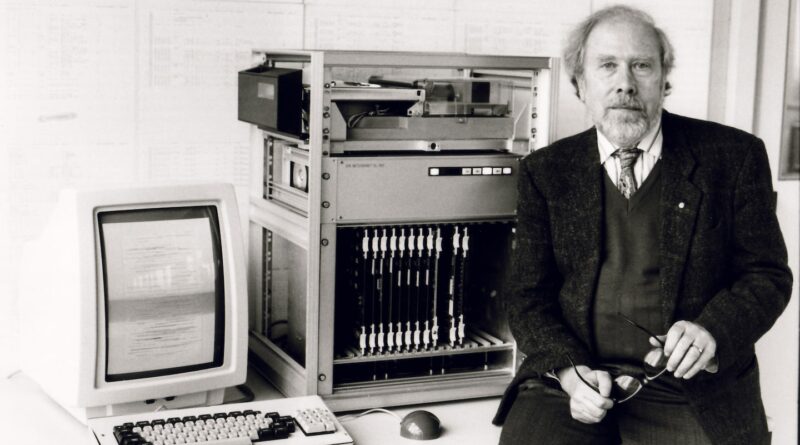Niklaus Wirth, software developer who saw power in simplicity, dies at 89
What emerged was unlike anything on the consumer market: a user-friendly screen of folders and menus and a curious scroll-and-click device dubbed a mouse — first with the commercial-flop Lisa in 1983 and then the groundbreaking Macintosh in 1984.
Jobs found inspiration wherever he could. One point of reference was just down the road at the Xerox Palo Alto Research Center and its in-house Alto computer network, forerunners of the desktop.
Another muse was a software visionary in Switzerland, Niklaus Wirth, whose elegantly simple coding language, Pascal, helped power the personal-computer revolution at Apple in the 1980s and elsewhere, and profoundly streamlined how programmers built their instructions.
“This was the first generation which was free to focus on what you could do with the computer rather than on the computer itself,” said Dr. Wirth, who died at his home in Zurich on Jan. 1 at 89.
Dr. Wirth’s Pascal — named for 17th-century French mathematician Blaise Pascal — brought a simplified language and intuitive logic into the digital realm in the early 1970s. Earlier computer coding options, including FORTRAN, BASIC and others, worked well with straightforward processes but often required complicated steps to execute more challenging functions.
Dr. Wirth liked to repeat an analogy coined by British computer scientist Tony Hoare, who described the pre-Pascal languages as akin to playing the piano with two fingers. Easy songs can be learned quickly, but harder pieces become exceedingly difficult.
Pascal’s spread was partly fueled by Dr. Wirth’s open-source initiatives. He made no attempt to profit off his creation, saying it should be a “public good.” He shared the source code with anyone who asked. At the same time, computers were increasingly becoming part of everyday use in academia and business. Access to Pascal gave a generation of young programmers a common tool kit to experiment and build code.
“Along came a generation who had ready access to computers and, most importantly, who had not to unlearn old habits,” he said in a 2004 interview with an academic journal published by the University of Klagenfurt in Austria.
Pascal variations took root across the industry, including for Microsoft Windows. A former software company, Borland, developed fast-running versions of Pascal, including the popular Turbo Pascal. Dr. Wirth “changed the way people think about programming,” one of the Borland co-founders, Philippe Kahn, told BusinessWeek.
In 1984, Dr. Wirth received the Turing Award, often referred to as the Nobel Prize of computing, presented by the Association for Computing Machinery. In his speech at the awards ceremony in San Francisco, Dr. Wirth described the process of invention as separating “what is essential and what ephemeral” and, through trial and error, casting aside anything overcomplicated or unnecessary.
“One learns best,” he said, “by inventing.”
Niklaus Emil Wirth was born in Winterthur, Switzerland, on Feb. 15, 1934. His father was a geography professor, and his mother was a homemaker.
He recounted being deeply curious about mechanics and experimentation as a boy. He dabbled with a homemade chemistry lab in the basement, took apart radios and built model airplanes he sent aloft in the fields around his home. The crashes, he said, taught him lessons about the value of thrift and precision.
“If you have to pay [for repairs] out of your own pocket money,” he told BusinessWeek in 1990, “you learn not to make the fixes overly complicated.”
He received a degree in electrical engineering in 1959 from Zurich’s Federal Institute of Technology, known as ETH Zurich. He left Europe for further studies: a master’s degree in 1960 from Laval University in Quebec City and a doctorate in programming languages from the University of California at Berkeley three years later.
He took a position at Stanford University’s newly created computer science department from 1963 to 1967. He and colleagues developed computer languages, including a version of algorithmic language called Algol-W that was adopted by some universities to teach programming on the IBM System/360 mainframe computer.
Dr. Wirth returned to Switzerland to start a similar computer science program at ETH Zurich. He expanded on Algol-W to create the first iteration of Pascal, which was intended to teach programming students. The first Pascal code was in operation in 1970 on the university’s computers.
Gradually, Dr. Wirth introduced the concept of “structured programming,” which includes the ability to reuse common code for simplicity and reduce potential bugs. The concept, considered innovative in the early 1970s, became the standard for programming instruction.
“The art in engineering is not so much to make something very complicated,” Dr. Wirth said in a 1985 interview. “The art is to make a complicated problem simpler.”
In 1976, Dr. Wirth took a sabbatical to work at the Xerox Palo Alto Research Center, which would inspire the early Apple designers. He described the experience of having his own desktop computer as “overwhelming” and a motivation for deciding to share Pascal on an open platform.
At ETH Zurich, he later developed a high-performance computer workstation he called Lilith, and helped a Swiss start-up, Logitech, market the mouse. Logitech became one of the world’s largest makers of computer accessories. Dr. Wirth was appointed to lead ETH’s Institute of Computer Systems in 1990 and retired in 1999.
His marriage to Nani Jucker ended in divorce. He was married to Diana Blessing from 1984 until her death in 2009. Survivors include his partner since 2017, Rosmarie Müller; three children from his first marriage; six grandchildren; and five great-grandchildren. The family announced the death but did not provide a cause.
Dr. Wirth is often given credit as the father of a frequently repeated adage in computing: software speed is slowing relative to the pace of increased speed in hardware such as microprocessors.
“When you develop a program, it’s much harder to devise a simple solution than complicated ones,” he said. “Unfortunately, our computers are terribly uncritical. They swallow anything.”



